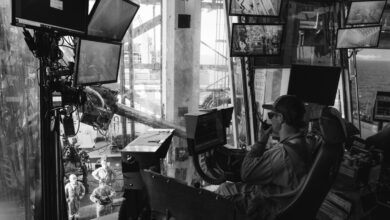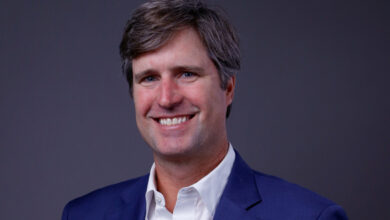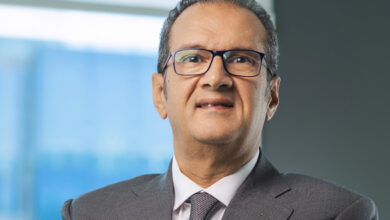TOTAL aims for ‘routine’ deepwater drilling in West Africa
By Jeremy Cresswell, contributing editor
The name TOTAL is synonymous with West Africa, and for sure the region ranks as the French group’s number one theater of activity. Moreover, the company has an excellent exploration track record and reputation as a technology frontier buster when it comes to developing discoveries.
While many of the headlines of recent years relate to Angola, John Bannerman, VP drilling & completion at the company, reminds us that TOTAL is also active in Nigeria, Congo, Gabon and Cameroon.
Angola is ranked top, though Nigeria would be close behind if it was possible for TOTAL to realise the various projects currently on the books there. Congo comes next in terms of rig commitments, followed by Cameroon and Gabon.
“In Nigeria and Angola, there are fluctuations, but basically we’re talking about a four-rig operation in both countries,” Mr Bannerman says. “In Congo, we’re talking today of something like a three-rig operation while it’s one each in the other countries, though it could rise to two in Gabon. But these are very rough numbers.”
TOTAL has a mix of jackups, tenders, semisubmersibles and drillships on contract for West Africa. In line with other operators in the region, the big challenge is securing sufficient competent deepwater/ultra-deepwater drilling units to enable delivery of its ambitions over the next several years.
“We project as best we can in terms of our rig requirement,” Mr Bannerman says. “It’s clear that we’re no longer in a market where you decide something in, say, June 2009 and expect to drill in August.
“We’ve known for some time what we’ve been wanting to do, not just in 2008, but also in 2009. We have those requirements more or less covered. Now our attention is on 2010 and beyond. For example, we have taken on the Stena Tay for a five-year term (four years firm plus a one-year option). This is a rig that is going to spend most of its time on exploration and appraisal. It’s one of our core mobiles and, in terms of exploration and appraisal work deepwater, it is the one that covers our requirements.
“We’ve also a long-term contract with the deepwater drillship GSF Jack Ryan … it’s on a six-year firm arrangement but not currently designated for explo-appraisal.”
That is because the Ryan is currently assigned to work on the Akpo field development offshore Nigeria. However, depending on drilling and well construction performance, this super-drillship may not be required at Akpo for the full contract term, in which case it may be released for other duties – perhaps exploration and appraisal work.
Whereas the deepwater-capable Ryan is delegated to Akpo, the Pride Africa and Pride Angola drillships are currently on Dalia, though both are likely to get involved in the Pazflor development offshore Angola at some point.
“We’ve done that to satisfy Pazflor requirements, but we also have a newbuild on the horizon, which is signed up, and we have a newbuild coming from Saipem, which is expected early 2010, and that’s on a five-year firm. It’s the real machine for Pazflor. They call it the 12,000.”
This sea vessel, being built by Samsung Heavy Industries in Korea, is supposed to be delivered Q1 2010 and will cut its teeth on Pazflor.
On the face of it, a fair number of new mobiles are being delivered from construction yards on or near time. However, what is of greater concern to Mr Bannerman is when they are commissioned.
“There are a lot of people saying their rigs are on track at the moment. My take on it would be that, until you have it commissioned and turning, one can’t be sure when it’s going to start making hole efficiently.
“While a rig’s in the yard, I would tend to say there’s a bit of optimism. But commissioning and starting up these rigs is never going to be easy.
“You only need to start turning some of the machines … remember that all the drilling equipment and related systems have to work smoothly together obviously … pumps, top drive, drawworks and everything else, and you can get some nasty surprises.
“It may be just an electronic card that needs changing out, but it can take a week. It could be something more important than that, and all of a sudden you’re in for a three months’ delay that you weren’t expecting.”
Turning to people issues and the need for a petroleum company such as TOTAL to respect host countries, Mr Bannerman is very clear about how important both issues are to long-term success and that, while France has deep historic links with Africa, that does not impart automatic rights. Close engagement with and involvement of the locals is regarded as crucial.
“It’s extremely important. If you go onto our rigs in Nigeria, it’s Nigerian faces that will strike you as comprising the majority of the crew, similarly Angola or elsewhere. Of course, I’m speaking for the drilling contractor when I’m saying this because it’s not TOTAL that is employing them.”
Does that mean this is part of TOTAL policy?
“Absolutely,” comes the reply.
“Obviously there’s a huge challenge on the new units, which have high levels of technology aboard. We obviously need to ensure that the rigs have highly trained electronics, electrical and hydraulics people on board, for example.
“Despite this, step onto any of the rigs that we have working for us in West Africa and you would find that the majority of the faces on board are from the host country.”
Mr Bannerman says that, for TOTAL, this has nothing to do with the diktats of host countries; it is embedded in the corporation’s culture.
“It’s all part of the way we see the world today. Of course we’re there to do business, but we’re there under the umbrella of sustainable development and everything that implies.
“It certainly means looking among local communities, finding people who are capable of doing the jobs that we need them to do and, if they’re not quite there in terms of skill sets, then helping them train into those jobs.”
Back to the business of drilling wells and the challenges presented in West Africa. TOTAL has notched up a large number of exploration successes, leading to a growing family of deepwater developments, starting with Girassol on Block 17, the so-called “Golden Block.”
Each successive development has born more than a passing resemblance to the one before, starting with Girassol, since when there have been Dalia, Rosa and now Pazflor.
Girassol was a groundbreaker in all sorts of ways. But how “routine” has the process of deepwater drilling (E&A and development wells) become, bearing in mind that no two reservoirs are ever alike?
Mr Bannerman: “We’re getting close to what one could call an industrial process, that is, being able to repeat what was done before. That includes a lot of the technical nuances of deepwater drilling. We have those fairly well under our belts now.
“It’s the same with technical competency, and we’re obviously transplanting that experience into manuals and procedures. So we’re well down the road of being able to manage the deepwater environment in terms of development drilling.
“But there are differences. Dalia, for instance, is not as deep a reservoir as Girassol; the sands are a little less consolidated and not quite as clean. That brings challenges.
“Each field has its own specifics, but we’ve got them well managed now. We’re in a fairly industrial process, but the geology can still make us question the various techniques that we use.”
Achieving something approaching an industrial process during development of successive fields in any deepwater province is more important than ever, in part because of the cost of drilling, with premium rig dayrates now north of $500,000.
“On a development project which you hope you have really well taped, each well is now extremely expensive … we’re talking several tens of millions of dollars,” says Mr Bannerman.
This makes thorough preparation prior to committing to the bit crucial … and that includes reviewing, rechecking and checking again and ensuring across technical disciplines, especially drilling and geosciences, that we are all in line.
“One can misinterpret, and if things go wrong, today the costs behind it are just enormous. So there’s quite a lot of pressure on quite a lot of people, especially our drilling supervisors and superintendents who are in the frontline,” he adds.
“It wasn’t by chance I used the term industrial process. But what does that mean for our management? If I say a well is going to cost $60 million, it should cost exactly that. Have a mishap and that $60 million can very quickly become $80 million.
“You have a real industrial process when you can guarantee your well is going to cost what you said and is going to produce what you said. And that’s a real challenge in our business.
“It’s what you’re looking for from your contractor. But we (the operator) have a role to play; it’s a team effort. We engineer our wells; so not all the problems come from our contractors. We’re clearly heavily involved.
“We need to engineer intelligently and innovatively. But the minute you say innovation, that means there’s some sort of risk, so you need to manage that risk because innovation is not an industrial process. It means you’re doing what you haven’t done before and that means learning curves.”





